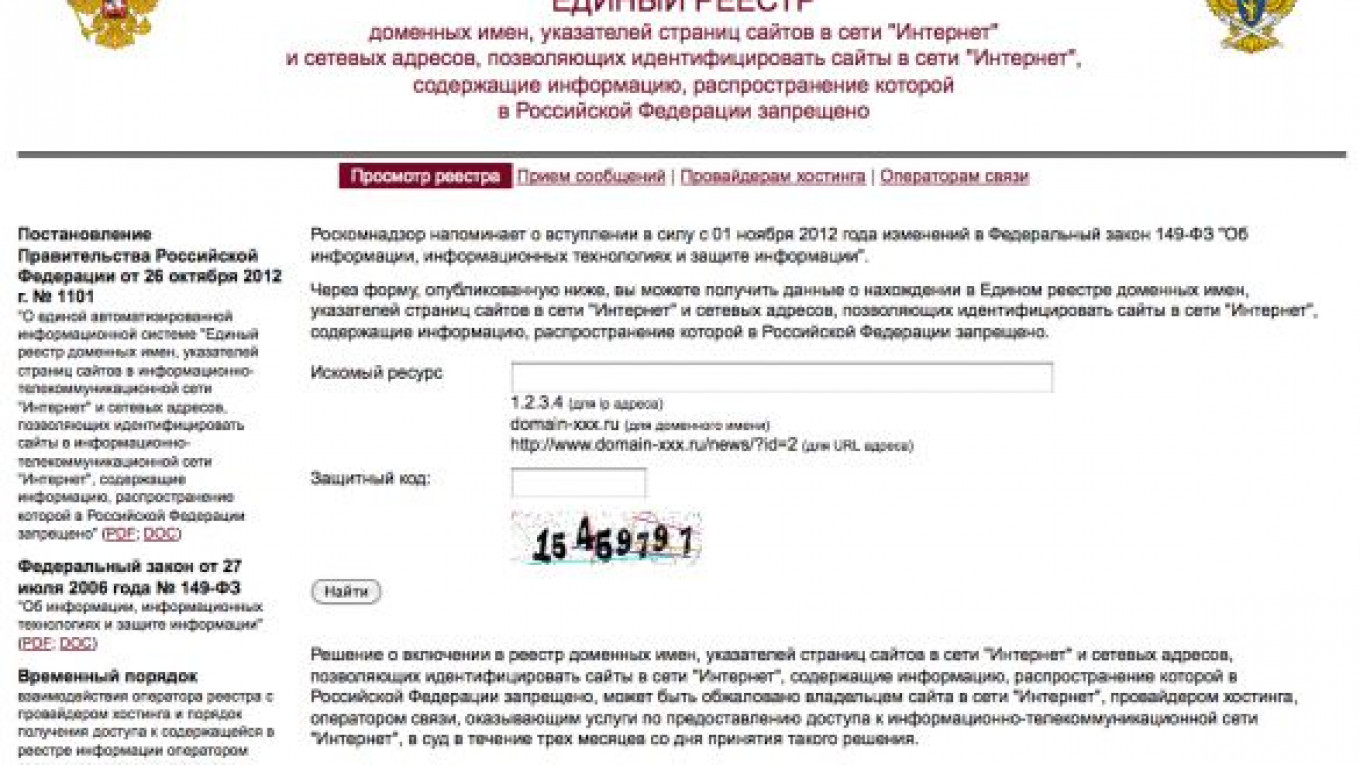The Communications and Press Ministry was inundated with more than 5,000 requests to ban various websites on the day a new Internet restriction law took effect.
Yet only 190 of the requests were deemed suitable for “expert” review, and fewer than 20 sites have so far been placed on the blacklist, the Federal Mass Media Inspection Service, the ministerial agency responsible for maintaining the list, said on its website Friday, a day after the program began.
Ten websites were banned by Friday, adding to the six that had been blacklisted a day earlier. The agency said the initial six were banned because an “expert opinion” concluded that they contained child pornography, but it didn’t explain the bans for the other 10 sites.
The blacklist is not publicly available. By law, the state should notify the domain owners, hosting companies and Internet service providers affected by the ban.
The only way for the general public to know whether a page has been officially blacklisted is to enter its address into a search engine on the agency’s website, zapret-info.gov.ru, which also accepts submissions for the list.
To file a submission, users must enter the Web page’s address into the online form, describe the content type (video, photo, text, etc.), and indicate whether the offending material is child pornography, promotion of drug use, incitement to suicide or other.
That matches the legislation itself, which bans Internet material displaying child pornography, soliciting children for porn, encouraging drug use or promoting suicide, and also bans distribution of content that is illegal under Russian law.
The form also encourages users to give “additional information, including the login/password and/or other information for access” to the Web page in question.
According to the registry website, the decision to shut down a Web page falls to officials at the agency running the registry, the Federal Drug Control Service or the Federal Consumer Protection Service, the country’s public health watchdog.
Complaints can be filed online by ordinary citizens, businesses, organizations, government agencies and local administrations.
No further information on the number of complaints, reviews or blacklisted pages had been released since last week. Monday was a national holiday. The addresses and names of the sites banned under the program have not been disclosed.
The Economic Development Ministry is urging restrictions on a type of Internet file-sharing technology called torrents as part of the government’s effort for “making the Internet safe,” the ministry said in a proposal sent to the Cabinet. According to the proposal, there should be a crackdown on “the distribution of illegal content, including torrents,” Interfax reported Friday.
Related articles:
A Message from The Moscow Times:
Dear readers,
We are facing unprecedented challenges. Russia's Prosecutor General's Office has designated The Moscow Times as an "undesirable" organization, criminalizing our work and putting our staff at risk of prosecution. This follows our earlier unjust labeling as a "foreign agent."
These actions are direct attempts to silence independent journalism in Russia. The authorities claim our work "discredits the decisions of the Russian leadership." We see things differently: we strive to provide accurate, unbiased reporting on Russia.
We, the journalists of The Moscow Times, refuse to be silenced. But to continue our work, we need your help.
Your support, no matter how small, makes a world of difference. If you can, please support us monthly starting from just $2. It's quick to set up, and every contribution makes a significant impact.
By supporting The Moscow Times, you're defending open, independent journalism in the face of repression. Thank you for standing with us.
Remind me later.






